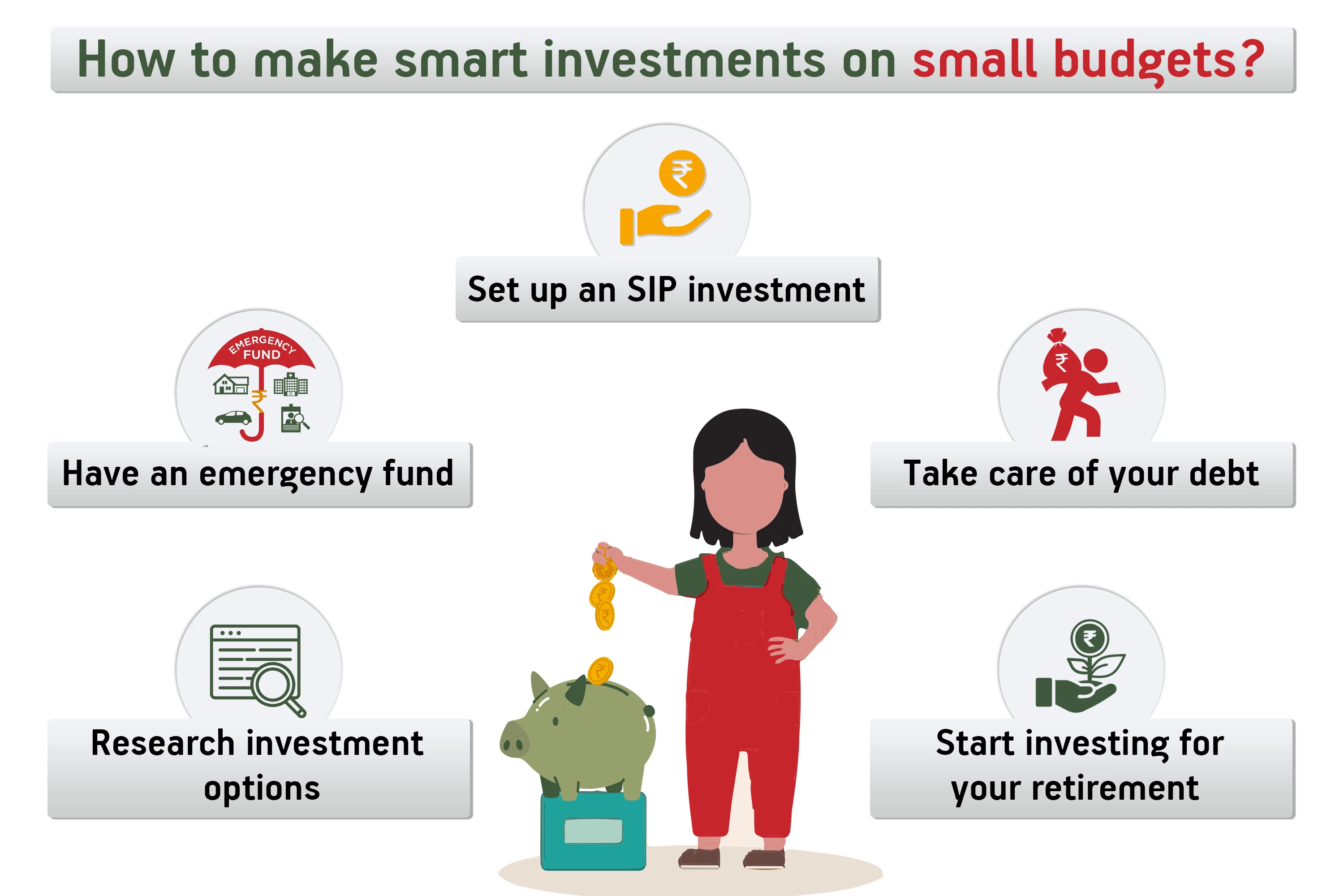-
Our Products
Our FundsFocus Funds
-
Self Care
Self-ServiceFind InformationWays To TransactPartner Solutions
-
Downloads
- Learnings
- About Us
-
More
-
Shareholders
-
Shareholders
-
-
SIP Calculators
- Back
-
Shareholders

IMPORTANT ALERT ! Beware of Fake AMC App, Online Impersonation & Scam WhatsApp Groups.

How to make smart investments on small budgets?
May 31, 2022
4 min
3 Rating
With the development of technology, the word 'smart' has become a buzzword in our lives. But do you know what it means to make smart investments? Can you invest small amounts and build a sizable corpus? You can with smart investing. There are many ways to invest within your budget by making the right moves.
People who think that only rich people can invest should read this article as we will show you how to use your small budget and make smart investments with it.

Research investment options
Before you can begin investing, look into the various available investment options. Each one will vary in terms of how much money you need to get started and the risk involved. Do your research to determine which option is right for you.
Have an emergency fund
The first thing you need to do while investing is build a fund for emergencies. This is known as the emergency fund. Most people don't have this fund, which makes them financially vulnerable in the case of emergencies like job loss, illness and so on. When you have this fund, you will be able to deal with financial crises and not panic when they arise.
How much should you keep in your emergency fund? A rule of thumb is that your emergen-cy fund should contain at least six months of living expenses.
Short term mutual funds or liquid funds could be considered to park your emergency fund.
Set up an SIP investment
If you are making enough money to put away 10% of your income, do that. If you want to put away 20%, do that. But whatever you do, get in the habit of saving something every month.
Start by putting aside a little amount every month, and then consider investing in a suitable mutual fund investment as soon as possible. The best way to invest in mutual funds is to au-tomate it by setting up a Systematic Investment Plan (SIP) so that a certain portion of your income is invested in mutual funds every month.
It is best to start investing as soon as possible and do so automatically every month through SIP investment.
Take care of your debt
You may be tempted to think that debt like personal loans and credit cards will not matter much as it may be a small figure. But the truth is that they do. Not only do they cause your credit score to plummet, but they also eat into your savings.
Pay off your personal loans and credit card debt first. This will help you invest the money you were spending on interest payments. They come with relatively high-interest rates, so paying them off should be a priority for your investment strategy.
If you have other debts with lower interest rates, such as student loans or home loans, keep paying the required amount each month while working on your high-interest debt.
Start investing for your retirement
Even at a young age, one of the main goals of saving and investing should be to guarantee that you have enough money after you retire. Mutual fund investments can help you invest and plan for your retirement.
The amount of time you need to save depends on how much money you want when you re-tire. The longer you put off starting to save, the more difficult it would be to close the gap. So even if saving for retirement seems far off in the future, it makes sense to start investing now if possible.
Conclusion:
Finding the right investment options might be difficult. But knowing the basics of handling your finances is easier. Having an emergency fund, cutting down bad debt and saving for retirement from day one are some ways to make smart investments in a budget. Maximis-ing your savings while minimising taxes and expenses can help you make wise decisions with your resources.
Mutual Fund investments are subject to market risks, read all scheme related documents carefully.





 1800-270-7000
1800-270-7000



